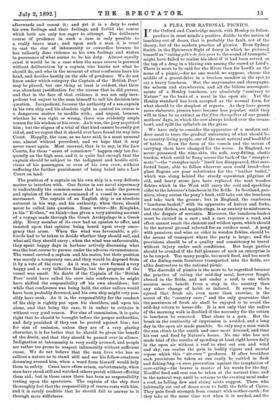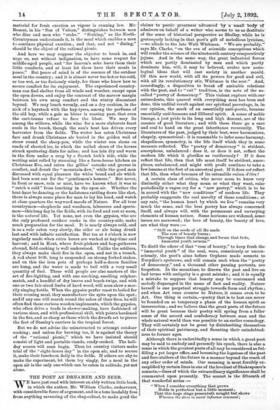A PLEA FOR RATIONAL PICNICS.
TF the Oxford and Cambridge match, with Henley to follow, produce in most minds a positive dislike to the notion of
lunching out of doors, that is probably the fault, not of the theory, but of the modern practice of picnics. Even Sydney Smith, in the Epicurean flight of fancy in which he pictured himself as "eating pa' tes de foie gras to the sound of trumpets," might have failed to realise his ideal if it had been served on the top of a drag in a blazing sun among the crowd at Lord's. There is more to be said for the River than for Lord's as the scene of a picnic,—for no one would, we suppose, choose the middle of a gravel-drive in a treeless meadow as the spot to eat a heavy luncheon. But the mayonnaise and champagne, the salmon and strawberries, and all the bilious accompani- ments of a Henley luncheon, are absolutely "contrary to Nature" as the basis of a meal in the open air. Yet the Henley standard has been accepted as the normal form for what should be the simplest of repasts. As they have grown more elaborate, picnics have become less popular, until they will in time be as extinct as the fetes champares of our grand- mothers' days, in which the cow always kicked over the cream- bowl, and spilt the syllabub on the grass.
We have only to consider the apparatus of a modern out- door meal to trace the gradual unlearning of what should be, to country-living people, one of the most natural and healthful of habits. Even the form of the vessels and the means of carrying them have changed for the worse. In England, we never possessed the wine-skin, the soft, easy-fitting, elastic burden, which could be flung across the back of the " sumpter- mule "—the " sumpter-mule " itself has disappeared, that sure- footed beast, able to follow wherever man could tread—but glass flagons are poor substitutes for the "leather bottel," which was slung behind the sturdy equestrian pilgrims of old, and heavy stone jars have replaced the neat wooden firkins which in the West still carry the cool and sparkling cider to the labourer's luncheon in the fields. In Scotland, pan- niers, slung across the pony's back, still take out the luncheon and take back the grouse ; but in England, the cumbrous "luncheon-basket," with its apparatus of knives and forks, hot-water dishes, and napkin-rings, is an anxiety to mistresses, and the despair of servants. Moreover, the luncheon-basket must be carried in a cart ; and a cart requires a road, and often cannot reach the choicest and wildest spots, which should be the natural ground selected for an outdoor meal. A pony with panniers, and wine or cider in wooden firkins, should be the means of transport where the party is large ; and the provisions should be of a quality and consistency to travel without injury under such conditions. But large parties should be avoided if the full pleasure of such an enterprise is to be reaped. Too many people, too much food, and too much of the dining-room furniture transported into the fields, are alike destructive to the rational picnic.
The discredit of picnics is the more to be regretted because the practice of eating the mid-day meal, however frugal, abroad in the fields, and not under a roof, is one which secures more benefit from a stay in the country than any other change of habit so induced. It seems to be agreed that fresh air, even more than exercise, is the secret of the "country cure ;" and the only guarantee that the maximum of fresh air shall be enjoyed is to avoid the mid-day return to house-life. It is not only that the radius of the morning walk is doubled if the necessity for the return to luncheon be removed. That alone is a gain. But the break in the continuity of impression is avoided, and a long day in the open air made possible. So only may a man watch the sun climb to the zenith and once more descend, and time his rest and food by Nature's hours. No one who has not made trial of the results of spending at least eight hours daily in the open air without a roof to shut out sun and wind and sky, can realise the gain in bodily vigour and mental repose which this " air-cure " produces. If after breakfast such provisions be taken as can easily be carried in flask and fishing-bag—a sure precaution against the temptation of over-eating—the bearer is master of his wants for the day. Needful food and rest can be taken at the natural time, and in the natural way, until he returns to the evening meal under a roof, as falling dew and rising mists suggest. Those who habitually eat out of doors seem to fulfil the fable of Cacus. They gain fresh strength from contact with mother-earth ; for they take at the same time rest when it is needed, and the
material for fresh exertion as vigour is running low. Mr: Beaant, in his "Son of Vulcan," distinguishes between men who dine and men who "stoke." "Stoking," as the North- Countryman understands it, is the meal which enables a man to continue physical exertion ; and that, and not "dining," should be the object of the rational picnic.
And here we may suppose the objector to break in, and urge us, not without indignation, to have some respect for middle-aged people, and "for heaven's sake leave them their little comforts, and at least let them have their meals in peace." But peace of mind is of the essence of the outdoor meal in the country; and it is almost never too hot or too cold, or too wet, or too furiously windy, for those who know how to secure comfort for its enjoyment. The experienced country- man can find shelter from all winds and weather, except upon the open downs, and enjoy the contrast of the narrow margin between his own snug comfort and the wintry discontent beyond. We may lunch warmly, and on a dry cushion, in the nick of a haystack with the hay-tyers, among the perfume of the old hay, while a gale so bitter is roaring past, that even the cart-teams refuse to face the blast. We may lie among the willows, while the wine for a more elaborate feast cools in the brook, though the sun's heat has driven every harvester from the fields. The writer has eaten Christmas fare and drunk Christmas ale buried in the golden wall of straw round the sheep-pen, while the winter sun shone on roads of sheeted ice, in which the nailed shoes of the horses struck sputtering dints for miles; and has lain dry and warm in the fern under a crag by a Scotch loch's side, while the -wetting mist rolled by steaming like a farm-house kitchen on Christmas Eve, and eaten the gillies' oatcake and grouse in comfort, and drunk the "mountain-dew," while the good men discussed with equal pleasure the white bread and ale which had been sent out for the "gentlemen's honour." Bat never, in frost or snow, rain or mist, have we known what it was to "catch a cold" from lunching in the open air. Whether the heat-haze be dancing, or the hailstones rattling down like shot, there is always some place for man to lay his head, and watch at close quarters the wayward moods of Nature. For all true countrymen—shepherds and woodmen, labourers and sports- men—this long day in the fields, with its food and rest at noon, is the natural life. Yet none, not even the gypsies, who are the only professed outdoor cooks in the country-side, make mach preparation for the meal. It is nearly always cold, and is as a rule eaten very slowly, the cider or ale being drunk last and with infinite satisfaction. But tea at 4 o'clock is now regularly made when extra hours are worked at hay-time and harvest; and in Kent, where fruit-pickers and hop-gatherers abound, field-cooking is well understood. Unlike the soldiers, they always make their fire in the open, and not in a trench. A rod about 10 ft. long is suspended on strong forked stakes, and on this the iron pots of perhaps half-a-dozen families are hung, and the water is made to boil with a very small quantity of fuel. These wild people are also masters of the art of fire-lighting, and with one smoking, smelling sulphur- match, and a handful of dry leaves and beach-twigs, and with one or two fair-sized limbs of hard wood, will soon show a mer- rily singing kettle. When the gypsies prefer roast to boiled for their evening meal, they manufacture the spits upon the spot ; and if any one will search round the ashes of their fires, he will often find these curious wooden implements, which the gypsies, -who often drive a trade in skewer-making, have fashioned of various sizes, and with professional skill, with points hardened in the fire, and as sharp as those which the dwarfs set to pierce the feet of Stanley's carriers in the tropical forest.
But we do not advise the uninstructed to attempt outdoor cooking ; and unless for brewing tea, it is against the theory of the "rational picnic," which we have insisted should consist of light and portable viands, ready-cooked. The holi- day season will soon begin. Then let country visitors make trial of the " eight-hours day" in the open air, and to secure it, make their luncheon daily in the fields. If others are shy to make the experiment, let them try singly, for a Meal in the open air is the only one which can be eaten in solitude, yet not alone.











































 Previous page
Previous page